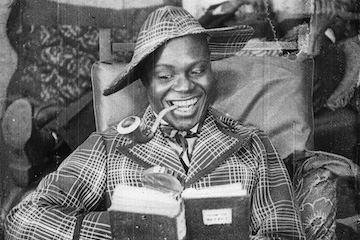
02/20/2024
It’s no mystery that Sherlock Holmes, created by author Sir Arthur Conan Doyle, has remained a fixture in popular culture ever since his first appearance in 1887. But SUNY Cortland Provost Ann McClellan, a British literature scholar, has done research worthy of the fictional detective himself to uncover details of a fascinating history that goes far beyond the books and popular screen versions that star the likes of Robert Downey Jr. and Benedict Cumberbatch. “The Sherlock Holmes You Never Knew: Black American Adaptations, Then and Now” will be presented by McClellan on Thursday, Feb. 29 from 6 to 7 p.m. in Old Main Colloquium. The talk is part of SUNY Cortland’s Black History Month event series.
The presentation will cover examples including musical theater, silent film, American jazz, graphic novels, fiction and fanfiction from the early 20th century to the present.
A scholar in 20th century British literature and culture, Sherlock Holmes and fan studies, McClellan is the author of "Sherlock’s World: Fanfiction and the Reimagining of BBC’s Sherlock" and "How British Women Writers Transformed the Campus Novel.” She was happy to see her talk selected for this year’s Black History Month and thinks it will be a fun topic for an audience.
"It brings things that people are familiar with — everyone knows who Sherlock Holmes is — and talks about pop culture,” McClellan said. “But it also talks about larger questions about representation in the media throughout the 20th century and the United States.”
What makes Holmes such a popular character to this day, she added, is also what’s made him a record-setter in the Guiness Book of World Records.
“He is the most portrayed literary character of all time,” McClellan said. “So, there are more movies, television shows, plays and whatever else featuring Sherlock Holmes than any other literary character.”
She explained that the reach of British culture through colonialism, a then-common belief that Holmes was a real person, and less restrictive copyright laws at the time all contributed to an astonishing spread of his stories around the world.
For the presentation, McClellan will focus on the history of Black Sherlock Holmes adaptations that have existed almost as long as the detective himself. And like the clues in any good Holmes story, much of this history was hidden until McClellan and other like-minded researchers looked closer.
“One of the really unexplored threads that I have found in my historical research is that there is this unstudied and mostly unknown tradition of Black American Sherlock Holmes adaptations, which goes back to 1902,” McClellan said.
With little scholarship focused on these variations, McClellan found the topic fascinating to dive into, and says that the sometimes-troubling history of these Black adaptations is a useful lesson.
I think it's relevant in a playful and entertaining way to challenge established histories and literature and film and cultural representation,” she said. “That what you think you might have thought was the real story or the real history is not necessarily the case. And, hopefully, it will encourage people to be more curious about other kinds of characters, stories, or portrayals that have been either valorized or neglected throughout media and cultural history, too.”
Her own fascination with the Sherlock Holmes stories began as a teen, McClellan said. Now, as she builds upon the information her upcoming talk is based on, she is using the topic to write a third book.
“This is the larger project I'm working on,” McClellan said. “Tracking these different incarnations, looking at what this might mean for our understanding of Sherlock Holmes in the history of this character in the United States and worldwide, and who Sherlock is and how he's seen by different cultures. But also, what this might mean for Black communities in America to appropriate this character, sometimes in historically racist ways like through using minstrelsy elements and yet other times really challenging structurally racist ideas — cultural ideas about black culture and black people. It's very wide-ranging.”